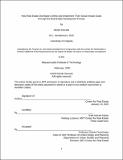How real estate developers define and implement their social impact goals through the real estate development process
Author(s)
Zaccack, Nicole(Nicole Remi)
Download1200232953-MIT.pdf (2.751Mb)
Other Contributors
Massachusetts Institute of Technology. Center for Real Estate. Program in Real Estate Development.
Advisor
Kate Martin Mytty.
Terms of use
Metadata
Show full item recordAbstract
As one of the largest industries in the world, real estate, has tremendous amount of impact in shaping cities, communities, and individuals. Now more than ever, we are facing major crises such as environmental injustice, housing shortages, increasing wealth gaps, and the displacement of middle and low income individuals from the heart of the city. We as people, investors, policy makers, and developers need to be extraordinarily more conscious about the impact we make in the built environment. This thesis will first explore the current context of social impact in the real estate sector, and outline the type and depth of impact real estate plays a role in. We will also review what resources, goals, and metrics are the standard for impact in real estate. Through recent reports and literature, we will discuss the major influences shaping social impact in real estate, and where the industry, as a whole, currently stands. This thesis will then look to real estate developers who are actively considering their social impact as they develop. Through a series of interviews, and a goal -- setting framework we will understand how these developers set goals, and implement said goals throughout the development process. Each of these developers will also explain how they measure the success of the goals, and how their organization compares to the rest of the industry. Through the literature review and interviews we will analyze if there is a shared definition for social impact in real estate and what is the optimal development process to ensure the greatest amount of positive impact. Through this analysis we will also layout the key considerations and opportunities all developers should be aware in order to shift the sector to create the greatest amount of positive impact.
Description
This electronic version was submitted by the student author. The certified thesis is available in the Institute Archives and Special Collections. Thesis: S.M. in Real Estate Development, Massachusetts Institute of Technology, Program in Real Estate Development in conjunction with the Center for Real Estate, 2020 Cataloged from student-submitted PDF of thesis. Includes bibliographical references (pages 100-102).
Date issued
2020Department
Massachusetts Institute of Technology. Center for Real EstatePublisher
Massachusetts Institute of Technology
Keywords
Center for Real Estate. Program in Real Estate Development.